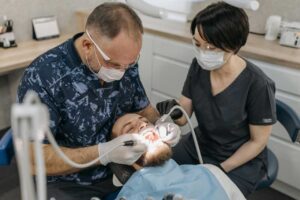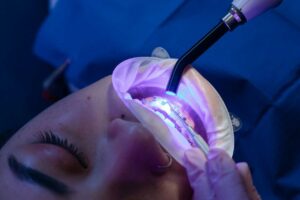
Cavities are one of the most common dental problems worldwide, affecting people of all ages. While they may seem like a minor inconvenience, untreated cavities can lead to severe pain, infections, and even tooth loss. Fortunately, cavities are preventable with proper oral care, a healthy diet, and regular dental visits.
In this comprehensive guide, we’ll explore everything you need to know about preventing cavities, from understanding their causes to adopting effective prevention strategies.
Looking for expert dental care? Visit 32 Dental Care for personalized advice and services.
What Are Cavities?
Cavities, also known as dental caries or tooth decay, are permanently damaged areas in the hard surface of your teeth that develop into tiny openings or holes.
- Causes:
Cavities are caused by a combination of factors, including:- Bacteria in the mouth.
- Frequent snacking or consuming sugary drinks.
- Poor oral hygiene.
- Dry mouth.
The Stages of Cavity Development
Understanding how cavities develop can help you take preventive steps early.
- Plaque Formation: Plaque is a sticky film of bacteria that forms on teeth. When you consume sugary or starchy foods, these bacteria produce acids that attack tooth enamel.
- Enamel Erosion: Over time, repeated acid attacks weaken the enamel, causing tiny openings or decay.
- Dentin Damage: Once the enamel is worn away, the decay progresses to the dentin, the softer layer beneath.
- Pulp Infection: If untreated, decay reaches the pulp, the tooth’s innermost layer, leading to pain and potential tooth loss.
10 Tips to Prevent Cavities
1. Brush Your Teeth Twice Daily
Brushing is the cornerstone of cavity prevention.
- Why It Helps:
- Removes plaque and food particles.
- Prevents acid buildup that erodes enamel.
- How to Brush Effectively:
- Use fluoride toothpaste and a soft-bristled toothbrush.
- Brush for at least two minutes, covering all tooth surfaces.
- Replace your toothbrush every 3–4 months or when the bristles fray.
Pro Tip: Consider using an electric toothbrush for more thorough cleaning.
2. Floss Daily
Flossing reaches areas that brushing cannot.
- Why It Helps:
- Removes plaque and food particles between teeth.
- Prevents gum disease and cavities in hard-to-reach areas.
- How to Floss Properly:
- Use about 18 inches of dental floss, wrapping it around your fingers.
- Gently slide the floss between teeth and curve it against the gum line.
Alternative: Use a water flosser if traditional floss is difficult to use.
3. Use Fluoride Products
Fluoride is a mineral that strengthens tooth enamel and prevents decay.
- Why It Helps:
- Remineralizes weakened enamel.
- Makes teeth more resistant to acid attacks.
- What to Use:
- Fluoride toothpaste.
- Fluoridated water.
- Fluoride mouthwash (as recommended by your dentist).
4. Limit Sugary and Acidic Foods
Diet plays a significant role in cavity prevention.
- Why It Helps:
- Reduces food for bacteria that produce harmful acids.
- Minimizes enamel erosion caused by acidic foods.
- Foods to Limit:
- Sugary candies and drinks.
- Acidic foods like citrus fruits and sodas.
Tip: Rinse your mouth with water after consuming sugary or acidic foods.
5. Stay Hydrated
Water is vital for oral health.
- Why It Helps:
- Washes away food particles and bacteria.
- Promotes saliva production, which neutralizes acids.
- Fluoridated water strengthens enamel.
Pro Tip: Carry a reusable water bottle to stay hydrated throughout the day.
6. Avoid Tobacco Products
Smoking and chewing tobacco are harmful to your teeth and gums.
- Why It Helps:
- Reduces the risk of gum disease and cavities.
- Prevents staining and bad breath.
Actionable Advice: Seek professional help to quit smoking or using tobacco.
7. Chew Sugar-Free Gum
Chewing sugar-free gum can help prevent cavities.
- Why It Helps:
- Stimulates saliva production.
- Neutralizes acids and strengthens enamel.
- Best Choices: Gums containing xylitol, a natural sweetener that fights bacteria.
Tip: Chew gum for 20 minutes after meals for maximum benefits.
8. Schedule Regular Dental Visits
Routine checkups and cleanings are essential for cavity prevention.
- Why It Helps:
- Detects early signs of decay before they worsen.
- Removes tartar that can’t be eliminated by brushing and flossing.
- How Often: Every six months or as recommended by your dentist.
Pro Tip: Don’t skip appointments, even if your teeth feel fine.
9. Protect Your Teeth with Sealants
Dental sealants are a preventive treatment that shields teeth from decay.
- Why They Help:
- Create a protective barrier on the chewing surfaces of molars.
- Last for several years with proper care.
Ideal For: Children and adults prone to cavities.
10. Maintain a Balanced Diet
Eating the right foods supports your overall and oral health.
- Why It Helps:
- Provides essential nutrients for strong enamel and gums.
- Reduces the risk of tooth decay.
- What to Include:
- Dairy products for calcium and phosphorus.
- Leafy greens for vitamins and minerals.
- Crunchy fruits and vegetables for natural cleaning.
FAQs About Preventing Cavities
Can cavities heal naturally?
While early-stage decay (enamel erosion) can sometimes be remineralized with fluoride, cavities that reach the dentin or pulp cannot heal naturally. Professional treatment is necessary.
How often should I brush and floss?
Brush at least twice a day and floss once daily to maintain good oral hygiene.
Are cavities hereditary?
Genetics can play a role in cavity risk, but lifestyle and oral hygiene habits are more significant factors.
Do all cavities hurt?
Not all cavities cause pain initially. By the time a cavity hurts, it may have progressed to an advanced stage.
For more FAQs, visit 32 Dental Care or Get Appoinment.
Conclusion
Preventing cavities requires a combination of good oral hygiene, a healthy diet, and regular dental care. By adopting these practices, you can protect your teeth and enjoy a healthy smile for years to come.



